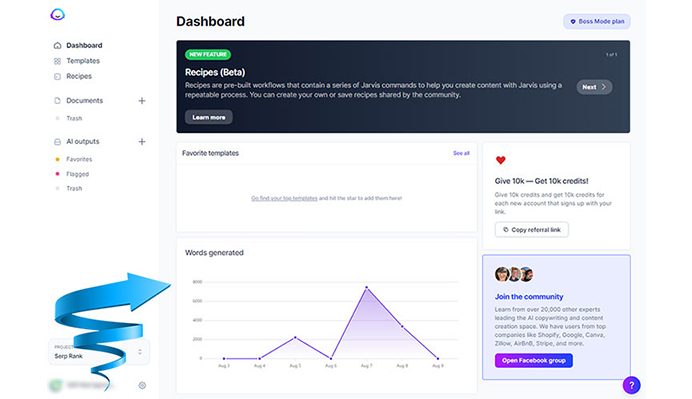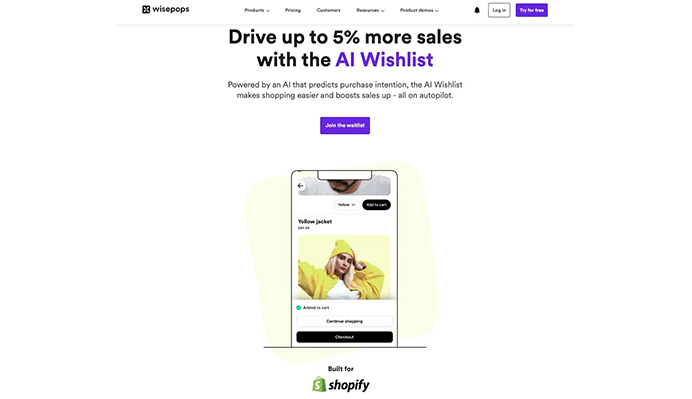The eCommerce industry has grown swiftly as more businesses compete for online shoppers’ attention. eCommerce businesses must come up with innovative strategies to attract and keep clients if they want to stand out in this fiercely competitive environment.
Utilizing the potential of artificial intelligence (AI) technology is a highly encouraging approach to accomplish this goal. Did you know that 78% of brands have already implemented AI tools in their online stores or plan to do so soon?
AI-powered eCommerce solutions are projected to be worth $16.8 billion by 2030, with companies relying on them to optimize expenses and target resources effectively. This technology provides better customer service and personalized marketing, making it a valuable tool for businesses looking to enhance their online presence.
This article will explore eight AI tools to grow your eCommerce business. We will examine the features, advantages, and practical applications of each technology for improving the operations of eCommerce businesses.
What Is Artificial Intelligence?
Artificial Intelligence (AI) is a branch of computer science that strives to develop machines that possess human-like intelligence, capable of executing tasks that would typically necessitate human intelligence.
AI has a fundamental objective of developing machines that can enhance their performance through experience-based learning. Machine learning achieves this by utilizing statistical models and algorithms to scrutinize data, identify patterns, and subsequently make predictions or decisions.
There are many different kinds of machine learning, including supervised, unsupervised, and reinforcement learning. In supervised learning, the machine is trained using labeled data, where the correct output is known for each input.
In unsupervised learning, the machine is given unlabeled data and must find patterns independently. In reinforcement learning, the machine learns by interacting with an environment and receiving rewards or penalties based on its actions.
Another important aspect of AI is natural language processing (NLP), which involves the ability of machines to understand and interpret human language. AI has many applications in different industries, including healthcare, finance, transportation, and entertainment.
Despite the many advancements in AI, challenges still need to be addressed, such as the risk of bias in machine learning algorithms and the moral ramifications of applying AI in some situations. As the field continues to evolve, researchers are working to address these challenges and unlock the full potential of artificial intelligence.
Artificial intelligence (AI) tools are software or hardware devices created to aid in creating, implementing, and upkeep AI systems. These resources can be used to develop, train, and deploy machine learning models, analyze data, parse natural language, and more.
Factors to consider before selecting an AI Tool
You should consider several factors before selecting an AI tool for eCommerce business. This ensures that you select the platform that best suits your needs. These factors include:
- Business Needs: The first stage is to determine your company’s needs and objectives, including the areas where AI assistance is required. This could involve demand forecasts, product recommendations, customer service, inventory management, etc. Find the difficulties you wish to solve before considering an AI technology that can solve those problems.
- Technical Requirements: Consider your technical capabilities and the requirements for integrating an AI tool into your existing systems. Evaluate the required data formats, protocols, computational resources, and other technical considerations.
- Ease of Use: Choose an AI tool that is simple to use and can be integrated into your current systems. The tool should have an easy-to-use UI and be simple to utilize.
- Accuracy: The accuracy and precision of an AI tool are critical factors to consider. The tool should provide accurate predictions and recommendations with minimal errors or false positives.
- Customization: Different businesses have different needs, and an AI tool that can be customized to meet your specific requirements is a crucial factor to consider. Look for tools that offer customization options to ensure they can be tailored to your business.
- Scalability: As your firm grows, be sure the AI solution can handle the additional demands. To help your firm grow, look for solutions that can scale.
- Integration: Look for AI tools that can easily integrate with other tools and technologies you are already using, such as your eCommerce platform, CRM, or marketing automation tools.
- Cost: The cost of an AI tool is a critical consideration, and you need to factor in the initial cost and ongoing maintenance expenses. Ensure you consider tools that offer a good balance of features and affordability.
- Customer Support: Consider the vendor’s level of customer support. You should choose products that provide top-notch support services, such as manuals, tutorials, and helpful customer service.
8 AI Tools to Grow Your eCommerce Business
Many AI tools are available on the market, each with its advantages and disadvantages. Some tools offer free plans or trials, while others require a subscription or purchase. It is up to the eCommerce business to evaluate their needs and choose the tool that best suits them.
1. GrammarlyGO
GrammarlyGO is an AI-powered writing helper created by Grammarly. It uses cutting-edge natural language processing technology to improve and expedite the writing process. It also has generative AI capabilities that let users generate, edit, and optimize material.
Users are also able to enhance tone, clarity, and engagement in a variety of content formats. Mails, documents, and social media posts can use GrammarlyGO’s context-aware suggestions to utilize that feature.
Features
- Contextual writing assistance: Generates suggestions based on the context of your writing, including the intent and audience, ensuring content is relevant and engaging.
- Tone adjustments: Helps users match the tone of their writing to the desired goal, whether it’s formal, casual, friendly, or professional.
- Content generation: Assists with generating new content ideas, completing sentences, or even writing entire pieces based on prompts provided by the user.
- Personalization: Learns from user preferences and offers tailored recommendations for writing style, tone, and content structure.
- Clarity enhancements: Provides real-time suggestions to make writing clearer, more concise, and more impactful by removing redundancies and improving readability.
- Cross-platform compatibility: Works seamlessly across platforms like Microsoft Word, Google Docs, email clients, and web browsers.
Pros
- Time-saving: Automates parts of the writing process, such as drafting and editing, reducing the time it takes to create high-quality content.
- Personalized suggestions: Offers more personalized writing suggestions based on user intent, tone, and context, which improves both the writing quality and user experience.
- A broad range of applications: Useful for various writing tasks, from professional emails to creative writing, making it versatile for different user needs.
- Improved productivity: Features like content generation and sentence completion help users overcome writer’s block and produce content more efficiently.
- Seamless Integration: Works across multiple platforms and apps, making it easy to use wherever you’re writing.
Cons
- Over-reliance on AI suggestions: The tool may encourage users to rely too much on AI-generated suggestions, which could reduce creativity and original input.
- Subscription cost: GrammarlyGO is part of Grammarly’s premium offering, so it might be costly for casual users or those on a tight budget.
- Limited creative depth: While it helps with writing clarity and tone adjustments, it may not fully capture the nuances of creative or emotional writing in the way a human editor could.
2. Jasper
Jasper AI is a powerful AI writing assistant ideal for businesses looking to scale their content production. It’s widely used in eCommerce and marketing for creating blog posts, product descriptions, ads, and personalized content.

Let’s break down some key aspects of Jasper AI:
- AI writing assistant: Helps generate human-like content for various uses—blog writing, social media content, and more.
- SEO optimization: Suggests content improvements to rank better on search engines, increasing website traffic.
- Versatility in use: Jasper can write in different formats and tones, allowing users to tailor their content as needed.
- It helps optimize product descriptions, landing pages, and marketing copy, boosting sales by personalizing content.
Benefits for eCommerce
- Efficiency: Quickly generates large amounts of content, allowing businesses to focus on other strategic tasks.
- Personalized product recommendations: Helps create customized content for upselling and cross-selling products.
- Jasper chat: This feature enables users to train the AI about their company’s tone, voice, and goals, making content creation more aligned with business objectives.
- User-friendly interface: Its simplicity makes it accessible for users of all levels.
Cons
- The pricing may be steep for small businesses.
- While Jasper is good at producing content quickly, human review is necessary for ensuring creativity and accuracy.
Price
Plans from Jasper begin at $49 a month for small to medium-sized businesses. Solutions at the enterprise level are available upon request.
3. AI Wishlist

AI Wishlist is a tool that predicts purchase intentions by using information from visitor profiles, browsing activity, and sales trends. The products a visitor has visited are shown in an attractive notification feed, with the item they are most likely to buy at the top of the list based on the likelihood of purchase.
Here’s a detailed look at what the wishlist includes:
- Advanced problem-solving skills: It can take on challenging and intricate tasks in a variety of contexts, adjusting tactics and picking up knowledge from mistakes.
- Natural language understanding: It has the ability to comprehend and produce human language in a way that seems intuitive and natural, facilitating smooth user communication.
- Contextual awareness: The capacity to comprehend and remember context over protracted conversations or several sessions, enhancing answer relevance and customization, has made it favorable for eCommerce stores.
- Ethical decision-making: Integrated frameworks ensure that AI decisions and recommendations adhere to ethical standards, promoting fairness and moral integrity in its actions and advice.
- Self-improvement: It can keep learning and developing in response to fresh information, experiences, and criticism to improve performance and broaden one’s capabilities throughout time.
Benefits
- Enhanced user experience: Improved contextual understanding and personalization lead to more intuitive and engaging interactions.
- Greater efficiency: Advanced capabilities help streamline decision-making and task execution, enhancing overall performance.
- Creative outputs: Increased creativity in AI enables novel solutions and unique content generation.
- Seamless integration: Greater interoperability facilitates easier connections across various systems, improving usability.
- Ethical use: Emphasis on reducing biases and ensuring transparency make AI more trustworthy and ethically responsible.
Challenges
- Shopify exclusivity: The tool is limited to Shopify platforms, which restricts its use to users on other eCommerce platforms.
- The pricing may be costly for small businesses.
Price
The subscription costs $49 per month, though a 14-day free trial is available to test the features.
4. OptiMonk AI
OptiMonk AI is a conversion rate optimization (CRO) platform powered by AI to help marketers improve website performance without needing a dedicated CRO team. It automates processes like:
- Smart personalized: It increases relevance and increases conversion rates by aligning the content of landing pages with the adverts that appear on Google.
- Smart A/B testing: This type of testing automates A/B testing so users may perform several tests on various sections of a webpage, resulting in faster design and content optimization.
- Smart product page optimizer: Makes compelling product text, including headlines and descriptions, using AI to transform product pages into highly effective sales pages.
Pros
- Ease of use: By automating procedures, OptiMonk AI makes conversion rate optimization (CRO) easier to understand and accessible to people without a specialized CRO team or technological know-how.
- OptiMonk AI enhances the site’s performance and customers’ experience, resulting in increased conversions and sales. This leads to better returns on investment.
- With the help of OptiMonk AI, marketers can focus on other aspects of their campaigns and make choices more quickly by delegating some of the work associated with A/B testing and content optimization.
- Using tools such as the Smart Personalizer, OptiMonk AI ensures that website content is as relevant as possible according to the users’ behavior or interaction with ads, which can subsequently improve the conversion rate to meet and exceed the business’s expectations for customer satisfaction.
Cons
- Restricted customization: Although OptiMonk AI automates a lot of tasks, users who require a lot of customization may discover that they have little influence over how the AI does A/B testing or customizes content. Expert marketers might choose to have greater manual control over the testing procedure.
- Possibility of over-reliance on automation: While automation is simple to use, it is possible to rely too much on it, which could lessen the need for strategic decision-making. Marketers risk becoming indifferent to the subtleties of user behavior and missing chances to implement more original or perceptive adjustments.
- Initial Setup Complexity: Although the tool is easy to use for continuous optimization, firms who are not familiar with conversion rate optimization (CRO) tactics or procedures may find the initial setup to be difficult. It could take some time upfront to configure the Smart Personalizer and A/B tests correctly.
Cost
The monthly cost of customization for new brands looking to boost sales starts at $39.
5. Octane AI

Octane AI focuses on AI-powered recommendation systems to create personalized shopping experiences through quizzes and recommendations. It is characterized by:
- Personalized quizzes: Allows online store owners to create quizzes that recommend products based on customers’ responses.
- Platform Integrations: Popular platforms like Shopify, Klaviyo, and Zapier are easily integrated with Octane AI, facilitating data syncing across various marketing and eCommerce applications.
Pros
- Personalized shopping experience: Octane AI allows businesses to offer tailored product recommendations through personalized quizzes, improving customer engagement and satisfaction.
- Increased conversions: By using quiz data to recommend relevant products, Octane AI can boost conversion rates, as customers are more likely to buy items tailored to their preferences.
- Seamless integrations: The tool integrates with various marketing platforms, enabling businesses to easily sync and utilize quiz data for targeted marketing and customer engagement.
- Data-driven insights: The quiz responses provide valuable customer insights, helping businesses understand customer preferences, improving targeting, and enhancing future marketing strategies.
- Customizable quizzes Businesses can easily create and customize quizzes, making the tool adaptable for a wide range of products and industries.
Cons
- Time-intensive setup: Creating effective quizzes that deliver personalized product recommendations requires careful planning, which can be time-consuming for store owners.
- Learning curve: Some users may face a learning curve when integrating the tool with various platforms or when optimizing quizzes for the best results.
- Limited to certain use cases: Octane AI’s quiz feature may be more suitable for stores with a wide variety of products. Businesses with a limited product range might not find the tool as useful.
- Potential data privacy concerns: Collecting detailed customer data through quizzes can raise privacy issues if not handled carefully, requiring businesses to ensure compliance with data protection regulations.
6. Surfer AI
Surfer AI is a cutting-edge content creation tool that Surfer SEO created to help people create written material optimized for search engines. It utilizes the GPT (Generative Pre-trained Transformer) paradigm for natural language processing (NLP) to produce text optimized for search engines while maintaining a high standard of quality.
Its main advantage over other AI writing tools is its capacity to match material to user search intent and search engine algorithms, hence enhancing search rankings and user engagement.
Characteristics
- SEO-driven content generation: Focuses on producing content optimized for search engine rankings by analyzing SERP (Search Engine Results Pages) data.
- Keyword research & insertion: Automatically insert relevant keywords based on target topics, optimizing the text for SEO.
- Optimized headings: Generates SEO-friendly headings to improve structure, readability, and ranking potential.
- Real-time optimization suggestions: Provides insights and recommendations for keyword density, readability, and phrases to incorporate.
- SERP analyzer tool: Analyzes competitors’ pages to extract valuable insights for keyword placement and content structure.
- User-friendly interface: Simplified design for ease of use, making content creation and optimization intuitive.
- Image Suggestions: Suggest relevant images to enhance the article’s visual appeal and user experience.
Pros
- Content optimization: Excellent for SEO-driven content that aligns with search intent, improving search visibility and organic traffic.
- User experience focus: Real-time suggestions enhance readability and user engagement, making the content more attractive to search engines and readers.
- Comprehensive features: Combines keyword research, optimization, and visual enhancement (image suggestions) in one tool.
- High-quality NLP: Leverages GPT technology for minimal errors and superior text quality.
Cons
- Limited creativity: While focused on SEO, the content may lack creative depth or personalization compared to human-written pieces.
- Cost: Pricing may be high for individuals or small businesses compared to other AI writing tools.
- Dependency on AI: Over-reliance on AI-generated content can sometimes result in content that feels formulaic or robotic.
- Learning Curve: While user-friendly, mastering all the features for maximum efficiency may take time for some users.
Price
Plans for Surfer SEO, which include competitor analysis and content optimization, start at $69 per month.
7. Frase

Frase is an AI-powered content creation tool that streamlines the process of creating high-quality content for your website and social media channels. With Frase, you can easily create content quickly and accurately without spending hours researching, writing, or optimizing your content for search engines.
Features
- One of Frase’s main features is its research panel, which allows you to review your competitors’ keywords and topics in seconds, giving you valuable insights into what the market wants and where your competitors are focusing their efforts.
- Frase comes equipped with advanced analytics and insights functionalities, allowing you to detect opportunities for enhancing your content and keeping tabs on its performance metrics.
- It analyses the search queries and uses AI to create SEO-optimized content within seconds.
Pros
- User-friendly features
- Integration of Google search console and suggestions on internal linking.
- Useful for writing quality content
- It analyses the competitors and provides a concept map feature to help users understand the concept.
- You can create separate folders and categorise each content accordingly.
Cons
- Thoroughly examine the AI-generated content to clarify any mistakes. AI content writing cannot be reliable all the time.
- Since Frase supports the English language, it can be difficult for non-English speakers to use Frase.
- Does not provide support with every external tool and service.
Cost
The pricing ranges from $15 monthly for solo subscriptions to $45 and $115 monthly for basic and team subscriptions. The free subscription is also available for a search query per user.
8. Hubspot

HubSpot’s AI tools offer e-commerce businesses powerful ways to boost their online presence and sales.
Features
- the Website Generator, helps you set up professional-looking webpages.
- The AI Content Writer helps craft compelling product descriptions and blog posts to engage customers
. - The Social Caption Generator creates catchy captions to promote your products on social media.
- The Brand Voice tool ensures all your content aligns with your unique style to maintain a consistent brand image.
- SEO Recommendations help improve your store’s visibility in search results, driving more organic traffic.
- The AI Summarization feature condenses lengthy product information into easy-to-digest snippets, enhancing the customer shopping experience.
Pros
- It gives you a personalised experience by automating tasks.
- It helps make better decisions.
- Provides relevant content to the customers to keep them engaged.
Cons
- Pricing is on the higher side, making it not affordable for everyone.
- Not compatible with all other external tools.
- AI output must be thoroughly checked as it could be prone to several mistakes.
Pricing
Based on your needs, you can choose from a range of pricing offers. The starter plan includes basic AI tools and services and is for $50 a month. The professional plan includes advanced AI tools for $800/month. The enterprise plan comprises all AI tools and costs $3200/month. You can also avail some AI functions with the free plan.
10. Neural Love

Neural Love is an AI-powered image generator and enhancer tool designed to help eCommerce businesses create high-quality visual content.
Key features
- It can resize images up to four times their original size without losing quality. This is particularly useful for eCommerce businesses that need to display product images in different sizes and formats.
- Neural Love is used to restore old photography images and generate more realistic, HD-quality images. This is particularly useful for eCommerce businesses that sell vintage or antique products.
- Neural Love offers video and audio enhancement features. This is useful for eCommerce businesses that use video and audio content to showcase their products.
- Utilises AI algorithms to create high-quality images and avatars that represent the unique identity of users.
- You can generate artwork from the text. This can help create complex artwork from ideas.
Pros
- he easy-to-use interface makes it easily accessible.
- High-quality images give a professional touch to the pictures.
- You can use the audio and video features to showcase the product.
Cons
- A limited number of prompt options and templates.
- Limited customisation options for image and avatar generation.
Pricing
The pro version comes in the range of around INR 2056. You can also avail of a free plan that offers basic features.
8. Seamless.AI

Seamless.AI is designed to streamline sales by providing sales intelligence, including contact information and company data. Traditionally, salespeople spend significant time on prospecting, which involves identifying potential customers and obtaining their contact information.
This can be a time-consuming process, which can take away from the sales team’s ability to focus on selling. Seamless.AI addresses this challenge by using machine learning and AI algorithms to collect, analyze and categorize vast amounts of data from various sources. The platform then presents the salespeople with relevant contact information and key data points to help them target potential customers more efficiently.
Features
- There is a seamless.AI Chrome extension that allows you to export data whenever you like.
- Access updated info on 121M+ companies and 1.3B+ contacts.
- Seamless integration with other platforms like HubSpot, Zoho, and Salesforce.
- Compatible with LinkedIn.
Pros
- Beginner friendly
- Easy data management is possible with seamless integration with other CRM platforms
- Chrome extension to easily find leads on LinkedIn.
Cons
- High email bounce rate
- Cancellation terms are unclear, which can lead to inconveniences.
Pricing
Along with the pro and enterprise plan, you can also try out the free plan and start with 50 credits.
Advantages of AI Tools
Incorporating AI tools in your eCommerce businesses will provide you with the following benefits:
1. Personalization
AI tools can help eCommerce businesses personalize their customers’ experiences by analyzing their behavior and preferences, allowing for targeted recommendations and marketing.
2. Increased Efficiency
Your eCommerce businesses will boost operational efficiency by using AI to automate various tasks, including customer support, shipping, and inventory management. By saving time and money through automation, you are able to manage your resources and concentrate on other important facets of your operations.
3. Improved Customer Service
AI-powered chatbots are available round the clock to promptly address customer queries and complaints. They can quickly provide helpful solutions and streamline customer service, leading to higher customer satisfaction and retention rates.
4. Better Decision Making
Most AI tools analyze massive amounts of data and provide valuable insights to inform business decisions, including pricing, product recommendations, and marketing strategies. By leveraging AI-powered data analytics, businesses can make more informed decisions, leading to better outcomes and improved business performance.
Disadvantages
Despite AI tools having several advantages in the eCommerce sector, it still has its shortcomings. They include:
1. Lack of Human Touch
Human touch refers to the emotional connection and empathy that humans can provide in customer service interactions. AI tools may lack this ability, resulting in a more transactional and impersonal experience for customers, which could lead to lower satisfaction as customers may feel their needs and concerns are not being fully understood or addressed.
2. Limited Understanding of Context
Language is complex, and meaning can vary depending on the context in which it’s used. AI tools may struggle to recognize these nuances and misinterpret customer requests, leading to misunderstandings and potentially incorrect responses. This can result in frustration for customers who feel their needs are not being fully addressed or understood.
3. Expensive
Developing and integrating AI tools into a business can be costly, requiring significant financial resources, which may be a barrier for small eCommerce businesses with limited budgets. New AI development Services and integrating AI tools into a business can be costly, requiring significant financial resources, which may be a barrier for small eCommerce businesses with limited budgets.
4. Technical Issues
AI tools rely on complex algorithms and data analysis, which can be prone to technical issues such as errors in recommendations or incorrect data analysis. These issues can harm a business’s reputation if they result in poor customer experiences or incorrect decisions, highlighting the importance of rigorous testing and ongoing maintenance of AI systems.
Conclusion
AI tools come in various types, including Machine Learning, Natural Language Processing, Robotics, and Computer Vision. Each type serves an original purpose and has different applications, but they all have one thing in common, which is to automate tasks that require human intelligence.
The importance of AI tools cannot be overstated, as they help businesses improve efficiency, reduce costs, and enhance customer experience. Moreover, AI tools have the potential to transform various industries, including healthcare, finance, and transportation.
The tools also come with disadvantages. One of the common disadvantages is the lack of human touch, which can lead to a less personal and satisfying customer experience. AI tools may also struggle with understanding the nuances of language and context, leading to potential misunderstandings.
Additionally, the cost of developing and integrating AI tools into a business can be a barrier for small eCommerce businesses, and technical issues can arise, highlighting the need for ongoing maintenance and testing.
Acowebs are the developers of the WooCommerce Deposits– Partial Payments plugin that helps the customers pay a fixed price, percentage, partial payment, or deposits, for the products purchased from your Woocommerce store. It has also developed various other plugins, like Variation Swatches For WooCommerce, which can transform your product attributes and select dropdowns with the efficient and easy-to-use User Interface. Turn the product variations into beautiful swatches that go well with your theme styles












 Login
Login
 Cart
Cart







